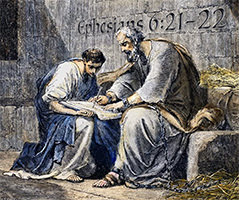
Ephesians 6:21–24 . . .
“Paul’s Final Greetings”
As we learned in our previous passage’s commentary of vv. 18–20, Paul viewed himself not merely as a lowly prisoner but as “an ambassador in chains.” He was a representative of the King of kings, albeit one in captivity. As a house arrest prisoner, Paul might have still been chained in his apartment. In some cases, prisoners were shackled to a Roman solder, which may have stirred Paul’s analogy of the armor of God. Others view the reference to chains as a generic metaphor for his imprisonment. Regardless, Paul had already spent previous time wearing chains as a result of his strong faith; he could rightly use that title.
Paul’s four closing verses begin the concluding section of the letter in which he expresses a desire to offer additional information about his situation in Rome. Besides having written this letter, he seems to have sent a particular person named Tychicus to the Ephesian church. Tychicus more than likely delivered additional information, along with Paul’s written greetings.
Near the end of Paul’s life, a few years later, he’ll mention his sending Tychicus to Ephesus (2 Timothy 4:12) and his plans to also send him to Titus (Titus 3:12). By this, we can conclude that Tychicus was a faithful helper to Paul in the final years of his life.
Today’s passage completes Paul’s letter to the local churches in Ephesus. He’d recently described essential tools needed to fight against spiritual warfare, using the analogy of a soldier’s armor. He’d also reminded Christians of the importance of prayer in our moment-by-moment discipleship with Christ. In these four closing verses, Paul will explain his plans to send Tychicus, one of his long-serving assistants, on a mission to deliver this letter and additional news to the church body in Ephesus.
Tychicus: Faithful Servant and Messenger (6:21–22)
In Paul’s final words, we can see that love is the key issue. In vv. 21–22 he speaks about love for one another, while vv. 23–24 speak of the love of and for God and the Lord Jesus.
Paul was interested in all believers, but he was also convinced that all of them were similarly interested in him. The thought that his situation was also of concern to others demonstrates the love that filled his heart. He wanted them to know how he was doing. Therefore he sent Tychicus to them.
Final Greetings
21Tychicus, the dear brother and faithful servant in the Lord, will tell you everything, so that you also may know how I am and what I am doing. 22I am sending him to you for this very purpose, that you may know how we are, and that he may encourage you (Ephesians 6:21–22 NIV).

“Ephesians 6:21–22”
Paul (right) writes his Ephesian epistle
that Tychicus will deliver to the church.
Click to enlarge.
To put these closing passages in context, consider this: What’s the most valuable item you’ve ever transported? We usually associate value with an expensive physical possession, right? But Paul informs us that Tychicus brought from a Roman prison to the church in Ephesus something far more precious than “gold.” He carried God’s Word, written under the written inspiration of the Holy Spirit by this apostle while imprisoned.
Tychicus is one of those behind-the-scenes people who worked with Paul. His home was originally in Asia Minor (Acts 20:4), and he’s mentioned five times in the New Testament; in all but one of these passages, he’s sent somewhere by Paul. Running errands might not seem like a glorious job, but his service for Christ was essential: He carried this letter from Paul to Ephesus, and he often served as a messenger: He delivered Paul’s letter to the Colossians (Col. 4:7–9), and was selected to be one of those who accompanied the financial collection gathered for the poor to Jerusalem (2 Corinthians 8:19). When Paul sent the slave Onesimus back to his master, Philemon, Tychicus accompanied him with Paul’s personal letter that requested his freedom. Tychicus was also one of those whom Paul regarded as competent enough to stand in for him in Crete.
These letters have been instructing, challenging, and encouraging Christians throughout the world ever since. And the job Tychicus had performed — to deliver Scripture — is a task still entrusted to believers today. God has given us his holy Word for our benefit. But he also made it available to us so we can share it with others. It’s the only sure source of absolute truth; it came directly from God through men who were inspired by his Holy Spirit.
Uncertain or false reports frequently produce uneasiness. To prevent this danger, Paul sent Tychicus on a mission. He didn’t transmit cool statistic data. He was fully involved with Paul and fellow believers. The Ephesians loved Paul and were saddened by his circumstances. Therefore they needed comfort. Tychicus knew how Paul felt and how he was doing; he was the right man for this messengering mission. Paul sent him because he would have been able to empathize with and give solace to the hearts of his beloved Ephesians.
Tychicus is commended, that his statements may be more fully believed. A “faithful servant in the Lord.” Although the Ephesians probably didn’t know Tychicus, they wouldn’t have needed to first get acquainted with him. His love for Paul and the love the Ephesians had for Paul would have been felt mutually.
When Paul personally informed his readers and listeners, “I am sending him to you for this very purpose,” he showed the sincere concern the apostle had for the churches; he felt the need to inform them of everything that might be for their interest, use, and service.
The Bible is our most precious possession. We should treat it with utmost care, sharing it with fellow believers as well as those who need to know our great God and Savior. The next time you open the Scriptures, ask the Lord to make you like Tychicus, the faithful messenger of his Word.
Peace, Love with Faith, and Grace (6:23–24)
The numerous personal greetings usually found at the close of Paul’s letters are entirely absent from this Ephesians epistle. All that we find in their place is this entirely general good wish, and the still more general and wider one in the subsequent verse. Hence the absence of these personal greetings is a strong confirmation of my opinion that this epistle wasn’t originally addressed to the church at Ephesus only. Instead, it appears to have been something of circular letter — intended to go round and be read to various churches in Asia Minor — sent first to the church in Ephesus.
In his concluding words in vv. 23–24, Paul mentions “peace” again. Verse 23 uses the Greek word adelphois, which refers here to both men and women believers, as part of God’s family, being “brothers and sisters” in Christ (similarly translated in NIV, NASB, NCV, NET, and NLT). Earlier in Ephesians, Paul referenced Christians in terms encompassing all people, regardless of gender (4:8). Paul’s wish for peace repeatedly extended to all believers in Ephesus.
23Peace to the brothers and sisters, and love with faith from God the Father and the Lord Jesus Christ. 24Grace to all who love our Lord Jesus Christ with an undying love (Eph. 6:23–24).
Paul’s desire was that “the brothers and sisters” would realize and sense “Peace…from God the Father and the Lord Jesus Christ” and “love with faith.” Today, realizing so many divisions and confusion, pain and rejection, we heartily join in this desire. Let us pray that this desire for “peace” may be fulfilled. Here we see how love goes together with confident faith. After all, the Lord is above all circumstances and will fulfill his counsel. There’s nothing out of his control. Our awareness of the extent and value of his love for us will forever strengthen our confidence in him. Thankfully, he’ll always love us.
The word “peace,” as in many epistle salutations, can mean a prosperity or harmony, because Paul mentions love, immediately thereafter. It’s Paul’s desire for the Ephesians to be peaceable and quiet among themselves; and this, he adds, may be obtained by brotherly love and through agreement in faith. From this prayer we learn that faith and love, as well as peace itself, are gifts that God bestowed upon us through Christ — they come equally from “God the Father and the Lord Jesus Christ.” Paul easily connects the Lord Jesus Christ with God the Father, thus demonstrating Jesus’ deity and equality with the Father. We should ask for one another and ourselves that God would increase our peace, love, and faith.
Yes, in addition to “peace,” Paul offered “love with faith.” These traits are acknowledged as originating “from God the Father and the Lord Jesus Christ” (v. 23b). Paul opened this letter with a dual emphasis on Father God and Christ; he now concludes by presenting them both. In Paul”s mind, he likely understood and appreciated the Father and Son as being the one and same God.
To his previous wishes, he adds “grace” (v. 24). Grace is the basis of all living. If we stand in grace, the awareness of the love that Father God and the Lord Jesus have for us will increase. And can our reaction be anything but a burning, unquenchable mutual love for the Lord Jesus Christ? We’ll love him more and more, together with “all who loves our Lord Jesus Christ with an undying love.”
Grace is a driving theme, not only in Apostle Paul’s ministry but in this letter in particular. He begins with grace (1:2), teaches on grace (1:6–7), notes salvation as being by God’s grace (2:5, 7–8; 3:2), calls himself a minister of God’s grace (3:7), teaches that grace is given as a gift (4:7), encourages our words to provide grace to others (4:29), and ends here with giving grace to all believers.
Paul had personally experienced God’s grace to receive salvation (Acts 9). And he committed the rest of his life to communicating this wonderful plan of salvation (Romans 1:16) to so many others.
Without the aid of servants like Tychicus, who were willing to stand in Paul’s place and act as his eyes and ears, Paul the apostle’s ministry would have been severely curtailed. He wrote this letter from prison, while serving as “an ambassador in chains” for Christ (v. 20). Faithful messengers like Tychicus not only extended Paul’s ministry across borders but across generations. We wouldn’t have the letter of Ephesians to read and study today if Tychicus hadn’t been faithful to his mission.
Concluding Summary and Review of Paul’s Letter to the Ephesians
The great theme of Ephesians is the eternal purpose of God: to sum up all things in Jesus Christ. The epistle falls into two halves: Chapters 1–3 reveal our exalted position with Christ in the heavenly places (2:4–6), all because God chose us in him before the foundation of the world (1:4); chapters 4–6 show our experiential walk with Christ in this world (4:1, 17; 5:2, 8, 15), as we stand firm against the evil forces of darkness in the heavenly places (6:10–20). Our position in Christ and our walk in this world as we stand victoriously against these evil forces demonstrate God’s eternal purpose. At the heart of this practical walk is the realization that we must get along in unity in the church and our home, which is the basic unit of the church.
“Doctrine occupies the greatest portion of the Book of Ephesians. Half of the teaching in this epistle relates to our standing in Christ, and the remainder of it affects our condition. All too often those who teach from this book bypass all the foundational instruction and go directly to the closing chapter. It is this chapter that emphasizes the warfare or the struggle of the saints. However, to benefit fully from the contents of this epistle, one must begin at the beginning of Paul’s instruction in this letter.
- As followers of Christ, we must fully understand who God declares us to be.
- We must also become grounded in the knowledge of God’s accomplishment for all humanity.
- Next, our present existence and walk must become exercised and strengthened. This must continue until we no longer totter or stagger back and forth with every spirit of teaching and subtlety of men.
Practical Application “Perhaps more than any other book of the Bible, the epistle to the Ephesians emphasizes the connection between sound doctrine and right practice in the Christian life. Far too many people ignore “theology” and instead want to only discuss things that are “practical.” In Ephesians, Paul argues that theology is practical. In order to live out God’s will for us in our lives practically, we must first understand who we are in Christ doctrinally.”[ 1 ]
Apostle Paul’s Personality and Passion on His Missionary Journey in Ephesus
† Watch this video highlighting Paul in Ephesus — created by Our Daily Bread Ministries.
Overview Video: “Ephesians”
† Here’s a superb run-through video of this epistle, created by BibleProject.
- Q. 1 How often do you share news and comfort the hearts of others the way Tychicus did?
- Q. 2 How did Paul’s circumstances influence his message to the Ephesians then? To us today?
- Q. 3 What does “undying love” mean in your relationship with Jesus?

